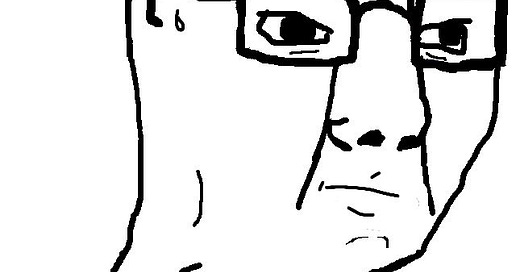Politics is an intimately personal affair, akin to religion.1 If you were molested by a Catholic priest, or you know somebody who was, this would intimately affect your view of the church. It is difficult to “be objective” in politics and religion.
The reason for this is that politics and religion are both moral. They seek to promote the good and punish evil. Moreover, both politics and religion fulfill a deep human need to be part of a team. Everyone prefers to be on the winning team, but even being on a losing team is preferable to being on no team at all.
Imagine being on a high school soccer team. The other team is faster, taller, stronger, better trained, more coordinated. You know all this before the game. Still, you put on your cleats, get on the bus, and prepare for the game. You know you will lose, but you still enjoy the camaraderie of your teammates on the bus. During the game, you’re elated to score a goal, even though the score is 1-6. You lose, but you still laugh with your friends on the ride home. Even though you’re losers, you’re still on a team.
The desire to be part of a collective is a selfish2 desire, like the desire for food or sex. It is part of our desire for structure, order, sociality, stability, identity, and security. Being on a team that gets wrecked all the time is still better, from an evolutionary perspective, than being an isolated individual. In a team, there is still a chance of an upset or an underdog come-back.
Depressed people seek out cults because depression is a state of psychological submission to social re-integration. If you are isolated, estranged, or cast out of your old tribe, then in order to find a new one, you have to appear harmless, weak, defenseless, like a baby.
Depression causes people to become self-effacing, to stop eating, to become lethargic, and basically hate themselves. This is evolutionarily preferential, since it allows new tribes to adopt you as one of their own. A strong, confident, virile, self-assured foreigner is threatening, and likely to be rejected. A soft, submissive, depressed person is not. Externally, a depressed person avoids being “threatening,” and internally, a depressed person is open to accepting bizarre or foreign ideas.
Sometimes cults are sexual in nature, sometimes they are political. The smallest cult is a cult of two: leader and follower. An abusive relationship can be thought of as the smallest possible sex cult. When a man stays in a relationship with an abusive woman, or a woman seeks out the company of abusive men, this is often due to depression and low self-esteem.
Starting around age 12, I began consuming political content. I now believe that my attraction to this content was to simulate the feeling of being “on a team,” even if that team was the losing team. This is because in real life, I had no sense of national identity, ethnic identity, religious identity, family identity, or even a sense of neighborhood or regional identity.
I followed no sports and didn’t play on a team; I wasn’t part of the Boy Scouts; I wasn’t allowed to hang out with the kids in my neighborhood; and I didn’t have a consistent cohort of classmates K-12 or “school pride.” This isn’t to say that I had it worse off than others, or to fish for pity. These are not excuses for my mistakes. This is my best attempt to understand my particular path of development. Some kids got hooked on drugs, others obsessed over girls: I was into religion, economics, and politics.
I was quickly dissatisfied with passive consumption of “team material.” Watching the news was not very fulfilling. I wanted to participate. I started to share my ideas online, and at age 12, I started a blog. This blog would get me in a bit of trouble, and I learned that there were consequences for speaking my mind. I realized that saying the wrong thing could ruin my life. So, with a little maturity, I resigned myself to commenting anonymously.
The deal I made with myself is that I would resign from public politics in order to pursue a successful career, and donate my money to causes I believed in. I believed that with education and hard work, I would secure a respectable career. Instead, I was unemployed or underemployed. The American Dream didn’t turn out as I expected.
To make money, I was forced to jump through humiliating hoops of HR obstacles-courses. The work I was doing was not only useless from the perspective of human progress and advancement, but actively undermined society through its economic parasitism. I tried switching careers several times, but I could never shake off the feeling that the company I was working for was actively scamming its customers, or employees, or the country at large.
I asked myself, “what is this life I am afraid of ruining? A middle-class career? Two kids and a two car garage?” Material things did not satisfy my desire to belong. I had the psychology of a religious fanatic. I decided that sacrificing my personal prospects was the moral thing to do — although, in retrospect, this martyr complex fulfilled the selfish desire to be loved, to be admired, to belong.
I gathered a small audience. As I put myself out there, and became less depressed, I started to question my adherence to the team. The humiliations I ran away from in the corporate world reappeared in the loserdom of politics.
I didn’t leave the dissident right in a day. Embarrassingly, it was a pitifully slow and confused process that occurred over a number of years. I had to detach myself from parasocial relationships with political e-celebs, my “heroes” and “mentors.” It was painful to leave the “circles and spheres” behind. I prided myself on being a “hard nosed realist,” a pessimist, with an intellect cold as steel, and yet my underlying psychology was soft and emotionally dependent on people who didn’t care that I existed.
I took my journey public in 2017, and my audience was able to observe my contradictory and inconsistent progression of thought over the years. As my opinions began to change, I was attacked by this audience for softening or hiding my “true views.”
In 2021, I came out with “Liars on the Right,” which was a series of ad hominem attacks on right-wing e-celebs. Even if the things I said were technically true, this series was more of an attempt to satisfy my emotional needs than to engage in rigorous academic discourse. I was trying to define myself, find myself, and construct my identity in the wreckage and rubble of what I left behind. I wanted to discover what could be, unburdened by what has been.
It is profitable to seem objective. To actually be objective, one must examine and be honest about one’s own personal biases. Toward that end, I will share 12 personal events or interactions that moved me away from the right. These are not necessarily “intellectual arguments,” but experiences which made me frustrated, disgusted, or resentful.
My purpose is not to relitigate these experiences, many of which were deeply private and involve other people. Instead, for those who are interested, I provide these biographical details in order to attempt to purge myself from these forms of wounded narcissism. An objective science of politics should not be motivated by feelings of woundedness or self-interest. But since I cannot become a robot, the next best thing is to be honest about what exactly my biases are, and to be aware of them. I also find it cathartic to complain about the craziness of my fellow weirdos. I’m hoping that by getting some scandals off my chest, I can let go of grudges, forgive, and move on. By holding onto these slights, I’m only hurting myself.











